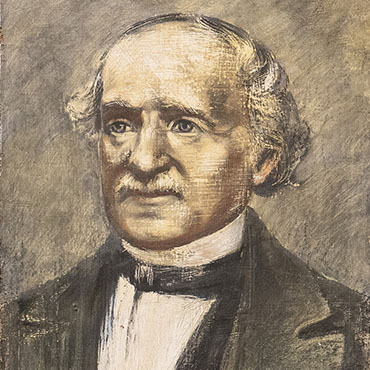Minich, who came from a Dalmatian family, was born in 1808 in Venice. After his father died prematurely on a business trip to the East, it was his mother who provided, as best she could, food and education for her children. Minch attended the school of San Giovanni Laterano, where he was the best student and won a government grant for the Santa Caterina high school, where he attended the philosophy course. His ability impressed Stefano Marianini, his physics teacher, who monitored and supported him, steering him towards science. Thanks again to state assistance on account of his particular abilities, he enrolled at the University of Padua, while at the same time attending the Accademia dei Costanti, where he produced translations and historical works, as well as literary prose and poetry. After graduating in mathematics, thanks to an imperial allowance, he started working as an engineer, also collaborating with Pietro Paleocapa, who was then in charge of public buildings.
The need to contribute towards the maintenance of his family forced him to look for employment that was more rapidly remunerative, such as assistant in the department of agriculture and natural history in Padua and teaching mathematics and elementary mechanics at the high school in Bergamo, a post he never took up, because of a sudden vacancy in the department of higher calculus at Padua, where he was appointed as a temporary teacher. After achieving a second degree in philosophy, Minich won the competition for the chair of higher pure mathematics and in 1842 became a full professor. He was meticulous and attentive to the needs of his students and, as a teacher, he was renowned for the clarity of his explanations. The contents of his lectures resulted in a treatise on differential and integral calculus, although this remained a draft and was never published. Although his listeners were engineers, he held courses on algebra and analysis so as to help them in their understanding of pure mathematics. As a scholar he was mainly interested in the integration of differential equations, in the differential properties of curves and of algebraic equations, and in the geometrical applications of infinitesimal analysis.
He was a man of vast culture who was totally convinced of the integration of scientific and humanistic studies, and he also published historical and literary studies, mainly on topics regarding Dante and, to a lesser extent, Petrarch. He was a member of the Accademia Patavina and of the Istituto veneto di scienze, lettere ed arti, eventually becoming president of both. He was also a member of the Accademia dei Lincei and of the Accademia dei XL, Chancellor of the University of Padua and Dean of the Faculty of Mathematics and Philosophy. He was elected as a Member of Parliament in Venice for three legislatures, being involved with the conservation of the lagoon as a member of government commissions, a problem that took up his full attention for a long time, to the point when it led him to abandon teaching.
Serafino Raffaele Minich died in Venice in 1883 as a consequence of a kidney disease. It was Antonio Favaro who commemorated him to the Istituto veneto, certain that in this way he could “pay his debt of gratitude to the memory of the Maestro, who for as much as twenty years [had done him the honour of] his constant kindness”. Favaro had been a student of Minich and for four years had replaced him in teaching: the picture that he left of him, extensive and detailed, praised his merits as a scholar and his rare sensitivity as a man.


